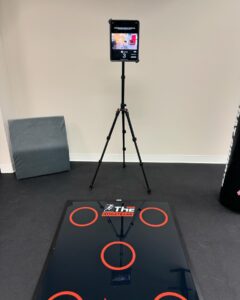Neurocognitive Testing
 Neurocognitive testing involves a series of tasks and assessments designed to measure brain functions such as memory, attention, processing speed, and executive function. These tests provide valuable insights into how well an individual’s brain is working, particularly after an injury. For athletes, neurocognitive testing can help in understanding the impact of sports-related injuries on cognitive function and can guide rehabilitation strategies. The testing is typically conducted using computerized tools, standardized questionnaires, and sometimes physical tasks, offering a comprehensive view of cognitive health.
Neurocognitive testing involves a series of tasks and assessments designed to measure brain functions such as memory, attention, processing speed, and executive function. These tests provide valuable insights into how well an individual’s brain is working, particularly after an injury. For athletes, neurocognitive testing can help in understanding the impact of sports-related injuries on cognitive function and can guide rehabilitation strategies. The testing is typically conducted using computerized tools, standardized questionnaires, and sometimes physical tasks, offering a comprehensive view of cognitive health.
For athletes who have undergone anterior cruciate ligament (ACL) reconstruction, neurocognitive testing plays a crucial role in their recovery and return to play. ACL injuries and their subsequent surgeries can affect not only the physical aspects of an athlete but also their mental and cognitive functions. Stress, anxiety, and changes in brain function due to injury and recovery processes can impact decision-making, reaction times, and overall cognitive performance. By conducting neurocognitive tests, medical professionals can assess these impacts and tailor rehabilitation programs to address both physical and cognitive recovery, ensuring a holistic approach to healing.
 The importance of neurocognitive testing for ACL-reconstructed athletes extends beyond immediate recovery. These assessments can help identify lingering cognitive deficits that may not be apparent through physical evaluation alone. Addressing these deficits is essential for reducing the risk of further injury and optimizing overall athletic performance. By integrating neurocognitive testing into the rehabilitation process, healthcare providers can ensure that athletes are not only physically ready to return to their sport but also mentally prepared, thereby enhancing their safety and performance on the field.
The importance of neurocognitive testing for ACL-reconstructed athletes extends beyond immediate recovery. These assessments can help identify lingering cognitive deficits that may not be apparent through physical evaluation alone. Addressing these deficits is essential for reducing the risk of further injury and optimizing overall athletic performance. By integrating neurocognitive testing into the rehabilitation process, healthcare providers can ensure that athletes are not only physically ready to return to their sport but also mentally prepared, thereby enhancing their safety and performance on the field.
Price: $200 per session
Time: 15 min
